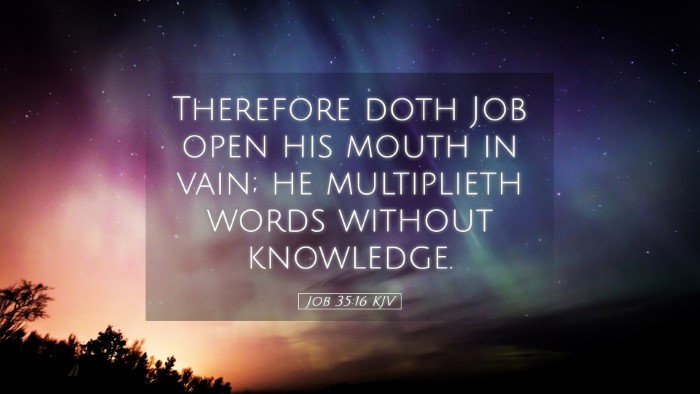Old Testament
Genesis Exodus Leviticus Numbers Deuteronomy Joshua Judges Ruth 1 Samuel 2 Samuel 1 Kings 2 Kings 1 Chronicles 2 Chronicles Ezra Nehemiah Esther Job Psalms Proverbs Ecclesiastes Song of Solomon Isaiah Jeremiah Lamentations Ezekiel Daniel Hosea Joel Amos Obadiah Jonah Micah Nahum Habakkuk Zephaniah Haggai Zechariah MalachiJob 35:16
Job 35:16 KJV
Therefore doth Job open his mouth in vain; he multiplieth words without knowledge.
Job 35:16 Bible Commentary
Commentary on Job 35:16
The Book of Job is a profound exploration of the nature of suffering, divine justice, and the complexity of human faith in the face of adversity. In Job 35:16, we encounter a significant proclamation by Elihu, illustrating the intricate relationship between God and humanity, particularly in times of distress and questioning.
Verse Analysis
Job 35:16: “Therefore doth Job open his mouth in vain; he multiplieth words without knowledge.”
Elihu’s Critique
Elihu, the youngest of the three friends who have argued with Job, represents a voice of youthful vigor and zeal that seeks to correct both Job and his friends. Here, he critiques Job for what he perceives as a futile expression of anguish and confusion. His statement emphasizes the notion that Job’s speeches, though eloquent and passionate, lack the substance of true understanding regarding God’s ways.
Insights from Public Domain Commentaries
Matthew Henry’s Commentary
Matthew Henry notes that Elihu's remarks highlight the dangers of speaking in frustration and the necessity of grounding one's words in wisdom and understanding. He elaborates that speech “in vain” indicates words that do not glorify God or contribute to the truth of the matter at hand. Henry emphasizes that believers should be cautious when expressing their thoughts on divine matters, particularly when those thoughts are rooted in personal distress rather than a clear revelation of God’s nature.
Albert Barnes’ Commentary
Albert Barnes interprets Elihu’s assertion as an indication that Job's lamentations have strayed from reverence for God’s omnipotence and wisdom. He posits that Job's complaints illustrate a misunderstanding of God's purposes, suggesting that they arise not from a place of reasoning but rather from a heart overwhelmed by suffering. Barnes encourages readers to recognize that true knowledge of God should manifest itself as trust and submission, even amid tribulations.
Adam Clarke’s Commentary
Adam Clarke provides a more in-depth look at the implications of Job’s words being labeled as “words without knowledge.” He argues that Elihu's statement serves as a catalyst for Job’s eventual reflection and deeper theological understanding. Clarke points out that genuine dialogue with God should stem from a spirit of humility and reverence, and that words must align with God’s character as revealed through scripture and experience. Job's tendency to speak without fully grasping the complexities of divine justice is a caution for all believers to remain anchored in humility before God.
Theological Reflections
This verse invites pastors and scholars to examine the role of speech in the lives of believers, particularly during trials. It raises critical questions:
- What is the nature of our expressions to God in times of pain? Are they grounded in knowledge, or are they mere reflections of our emotional states?
- How can we ensure that our words reflect an accurate understanding of God’s character? True communion with God involves not only speaking but also listening and understanding.
- What does it mean to speak “in vain” regarding God’s purposes? This underscores the importance of aligning our discourse with scriptural truth and a divine perspective.
Practical Applications for Ministry
For pastors and ministers, the insights drawn from Job 35:16 serve as reminders of the significance of teaching the congregation to articulate their pain in ways that honor God. Encouraging members to seek deeper knowledge of God, rather than superficial complaints, can create a more robust faith community.
In counseling and pastoral care, it is crucial to help individuals navigate their suffering while also guiding them toward the ultimate truths of God’s sovereignty and justice. The balance of honesty in expressing doubt and maintaining foundational truths about God can help foster a healthy dialogue within the church regarding suffering and divine justice.
Conclusion
Job 35:16 encapsulates a critical moment in the discourse surrounding suffering and divine justice. The words of Elihu challenge Job to reflect on the depth of his understanding and the heart from which his words flow. It serves as a vital reminder for all believers to seek knowledge and wisdom in their expressions, ensuring that their words—not only reflect their struggles but also align with a deeper understanding of God’s nature.


